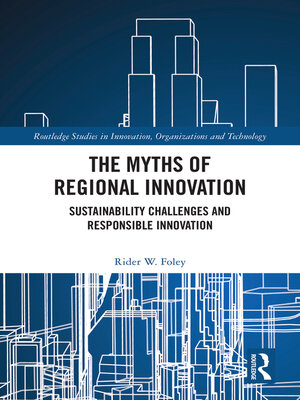The Myths of Regional Innovation
ebook ∣ Sustainability Challenges and Responsible Innovation · Routledge Studies in Innovation, Organizations and Technology
By Rider W. Foley

Sign up to save your library
With an OverDrive account, you can save your favorite libraries for at-a-glance information about availability. Find out more about OverDrive accounts.
Find this title in Libby, the library reading app by OverDrive.



Search for a digital library with this title
Title found at these libraries:
| Library Name | Distance |
|---|---|
| Loading... |
Billions of dollars, Euros, yen, and yuan in public funds are spent annually to promote innovation in metropolitan regions, attempting to transform the economy by attracting technology-based companies and supporting small startups to secure high-paying jobs. The impacts of those investments are typically assessed in terms of economic growth, venture capital, and jobs. Regional innovation is assessed with financial measures that do not account for the distribution of wealth, nor do they evaluate if innovation addresses broader sustainability concerns. This book draws on evidence from 144 interviews with civic leaders in three urban regions—Atlanta, Phoenix, and the Twin Cities—to illuminate three commonly accepted but flawed myths about innovation that misdirect policymakers and civic leaders and perpetuate the idea that innovation is solely about economic growth. This book offers evidence of the social networks, labor divisions, and conditions enabling innovation to dispel those three myths and propose more nuanced and realistic ways of thinking about regional innovation.
This book is not an argument against innovation. Rather, it critically reflects upon investments in innovation and showcases laudable efforts to create a livable and sustainable city. The book offers a novel method to assess the processes and outcomes of innovation in a manner that can complement economic approaches. The author lays bare the human values that motivate city staff, corporate officers, and academic partners and highlights the efforts of organizations that often remain underappreciated. The evidence presented in this book puts forward a means to assess if (and how) innovation contributes to an equitable and sustainable future or if it perpetuates injustices and economic stratification.
The Myths of Regional Innovation will appeal to scholars across broad fields, including innovation studies, technology management, entrepreneurship, economic development, and public policy.







